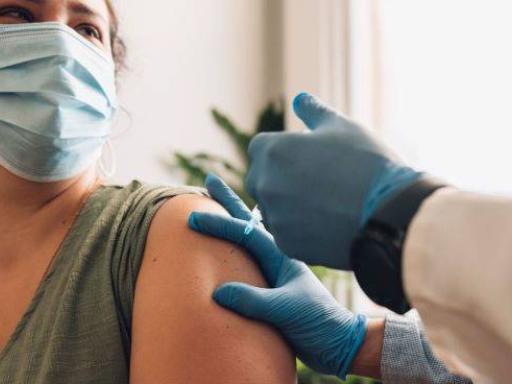The Centers for Disease Control and Prevention (CDC) recently highlighted the work of a CMF member and local nonprofit in promoting access to COVID-19 vaccines for Hispanic/Latino residents in Grand Rapids.
The Community Foundation of the Holland/Zeeland Area (CFHZ) partnered with the Hispanic Center of Western Michigan, University of Michigan Health-West and the Kent County Health Department to provide equitable access to COVID-19 vaccines to Hispanic/Latino residents from November 2021 through January 2022 via weekly mobile vaccine clinics.
In total, 165 doses were administered in November and increased to more than 330 doses per month in December and January.
“The Hispanic Center of Western Michigan’s work around vaccine equity has made them community immunization champions, paving the way with innovative initiatives to create vaccine accessibility and educational materials,” Yadah Ramirez, program officer/college success coach at CFHZ said.
According to the CDC, the data shows that vaccination rates for Hispanics/Latinos are often lower than rates for other racial and ethnic groups.
“The Hispanic Center’s work to build community trust stems from prioritizing relationship-building with residents. These relationships have helped their organizations’ efforts to have a broader impact and lasting benefits,” Ramirez said.
To ensure success, these organizations were intentional about addressing the following barriers to vaccination:
- Provided equitable access to information: The Hispanic Center worked to build community trust by sharing flyers conveying COVID-19 information in grocery stores and homes, and by having one-on-one conversations with many of the people receiving the information. Center staff also provided information at school meetings, and they regularly shared information and videos on social media.
- Developed accessible and inclusive educational materials: Interpreters assisted nurses, and Spanish-speaking volunteers helped people with vaccination registration and in understanding the overall process. In addition, the center worked with bilingual doctors and community members to create educational videos in Spanish about COVID-19 vaccination.
- Addressed transportation challenges: The Hispanic Center provided bus passes for people coming to the mobile vaccination site in the center’s parking lot.
- Eliminated the requirement of state identification and/or proof of health insurance at vaccine clinics: According to the CDC, Hispanic people are the largest population segment without health insurance coverage in the nation. Hispanic people without documentation may fear their information will be recorded and shared with immigration authorities.
CFHZ has been working to support vaccine access and equity in the community it serves as an implementation partner.
“For over a year now, these community nonprofit partners have strategized best practices for providing the Hispanic/Latino community with improved access to information about COVID vaccines and boosters and their benefits,” Ramirez said.
According to Ramirez, the community foundation led convenings with their community partners monthly to exchange best practices and foster shared learning.
“We will support vaccine equity and overall health equity moving forward by continuing to provide the opportunity and resources for community collaborations because we know that collaborations among community partners lead to community-centered solutions,” Ramirez said.
Want more?
Read the CDC’s full story.
